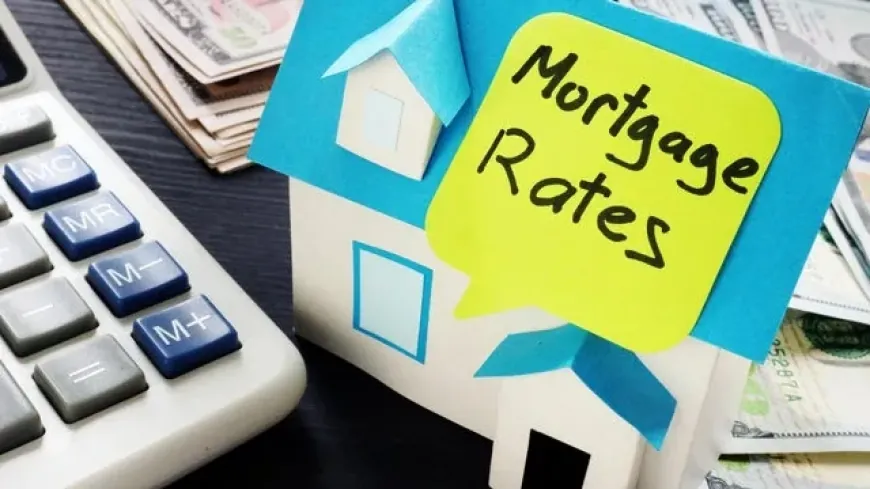Mortgage Rates Hover at 6.74%, Existing Home Sales Set to Fall Again
Mortgage rates remain flat this week at 6.74%, providing little relief during the peak buying season. Experts point to strong employment but continued volatility for the housing market.

The national average for a 30-year fixed-rate mortgage remains at 6.74% this week, essentially unchanged from the prior week’s 6.75%. This marks the third week in July where rates have hovered around the same level after two consecutive increases earlier in the month.
The 15-year fixed mortgage also declined slightly, falling from 5.92% to 5.87%. However, both rates remain well above historical norms. Compared to the same period two years ago—when the 30-year fixed hovered near 3%—today’s borrowing costs are more than double, significantly reducing purchasing power for prospective buyers.
Mortgage rates have now been sitting above 6.5% for most of the year, offering little relief during what’s traditionally the busiest homebuying season.
Buyers Are Active, But Limited
Mortgage applications for home purchases rose 3% over the past week, according to data from the Mortgage Bankers Association. On the surface, that signals a slight improvement in buyer activity. But the broader context shows that overall volume remains far below average.
Many of the buyers still entering the market are doing so out of necessity—relocations, job changes, or family needs. These are not discretionary moves. The rise in applications may reflect households adjusting their expectations, opting for smaller homes or longer commutes to afford current prices.
But high borrowing costs continue to block a large segment of buyers, particularly first-time homeowners. Affordability metrics remain near multi-decade lows, with mortgage payments now consuming a significantly higher share of household income compared to historical norms.
Refinancing Is Practically Frozen
Refinancing activity fell another 3% this week, continuing its prolonged decline. With most homeowners locked into mortgage rates between 2.5% and 4%, very few are choosing—or able—to refinance under current conditions.
This isn’t a temporary trend. Refinance volume has collapsed by more than 80% from pre-2022 levels. Lenders across the country have scaled back their refinancing departments, and some have exited the market entirely. Major banks and non-bank lenders alike are prioritizing new purchase lending and HELOCs (home equity lines of credit), while cutting back on refi offerings.
For existing homeowners, refinancing only makes financial sense if they're consolidating high-interest debt or extracting equity for critical expenses. The days of rate-and-term refinancing as a widespread financial strategy are over—for now.
Home Sales Are Trending Lower Again
The number of existing home sales is on track to fall below 4 million this year, a drop of roughly 1.5% from 2024’s already record-low level of 4.06 million. That would make 2025 the weakest year for home sales in over a decade.
This slump isn’t the result of weak demand alone. Buyers are still there—but sellers are not. Homeowners with low-rate mortgages have little incentive to list, leading to a sharp drop in available inventory. Without fresh listings, sales volume remains capped, regardless of buyer interest.
Some regions—particularly parts of the Midwest and Southeast—are seeing slightly better activity due to lower home prices. But major metros like Los Angeles, New York, and Seattle remain sluggish, weighed down by both price and rate pressure.
Sellers Stay Put to Keep Low Rates
One of the most significant drags on the current market is the “lock-in effect.” Millions of homeowners secured mortgage rates between 2.5% and 4% during the pandemic-era lows of 2020–2021. Trading that in for a 6.74% rate is a tough sell, even if they could get top dollar for their home.
This reluctance to sell is restricting inventory and driving up competition for the relatively few listings that do appear. Many homeowners are choosing to renovate rather than move, pushing demand into the home improvement and construction sectors instead of the resale market.
This dynamic isn’t likely to shift until borrowing costs fall below 5%—something that appears unlikely in the short term.
Jobs Are Stable, But Buyers Are Still Stretched
The labor market continues to hold up. Unemployment remains low, and wages have risen across many sectors. But inflation over the past two years has reshaped household budgets, and higher interest rates have reduced what buyers can afford.
A household that could qualify for a $500,000 mortgage in 2021 may now only qualify for $350,000 to $375,000 at today’s rates—if that. Combined with still-high home prices, this means many potential buyers are forced to delay their plans or shift their search to lower-cost markets, often far from job centers.
Even with solid income growth, housing affordability has worsened nationwide. The National Association of Realtors’ affordability index remains at levels not seen since the early 1980s.
Uncertainty Around Borrowing Costs Remains
While mortgage rates have stayed mostly stable this month, they remain unpredictable over longer periods. Rates still respond quickly to economic data, making it hard for buyers to plan. Any unexpected shift in inflation, employment, or government debt markets can push borrowing costs higher or lower within days.
Lenders are being cautious as a result. Many are adjusting loan pricing frequently, and some buyers are finding pre-approvals valid for only short windows. This adds another layer of difficulty for households trying to time their move or make competitive offers.
Borrowers are dealing not only with higher rates, but with less certainty. Until the cost of borrowing becomes more predictable, the broader market is likely to remain slow and uneven.
Also Read: Can House-Hacking Help First-Time Buyers Build Real Estate Wealth in 2025?
































































